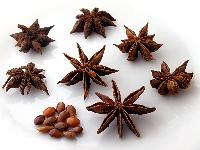
Aniseed
Get Price Quote

Anise Seeds
Get Price Quote
Do you suffer from gripping stomach pain? Or with cold and cough? Take a few sips of anise seed mixed in hot-water and you feel better instantly. These unique aromatic spicy seeds indeed are quite popular for their culinary and medicinal values. Anise botanically belongs to the Apiaceae family in the genus Pimpinella and known scientifically as Pimpinella anisum. The humble anise plant is native to Middle-East and Mediterranean region; probably originated on the fertile plains of Nile delta in the Egypt.Anise is a perennial herbal plant; generally, grows up to a height of about 2 feet. It bears white colored umbelliform flowers by July, and harvested by bringing down the whole plant once its seed-heads matured enough on the plant itself. Its seeds then separated from the flower heads by threshing. Anise seeds feature oblong or curved, comma shape, about 3-4 mm long, light brown color and fine stripes over its outer surface. The seeds feature delicately sweet and aromatic bouquet with a distinctive liquorice flavor. Their special fragrance is due to essential oil, anethole in them. Star anise (Illicium verum) is a spicy fruit, obtained from evergreen tree native to South-West China. It has similar flavor and taste like that of anise seed. Star-anise tree bears star-shaped fruits which turn rust-red color when ripen. Interiorly, these fruits envelope amber-colored seeds. Both the seed as well as fruit husks used as spice in cooking.Health benefits of anise : Exotic anise spice carry some of the important plants derived chemical compounds that are known to have been anti-oxidant, disease preventing, and health promoting properties. the main essential volatile oil that gives the characteristic sweet, aromatic flavor to anise seed is anethole. Other important compounds found in these seeds include estragol, p-anisaldehyde, anise alcohol, acetophenone, pinene and limonene. Anise seed oil obtained from extraction of the seeds has been found application in many traditional medicines as stomachic, anti-septic, anti-spasmodic, carminative, digestive, expectorant, stimulant and tonic agent. The seeds are an excellent source of many essential B-complex vitamins such as pyridoxine, niacin, riboflavin, and thiamin. Pyridoxine (vitamin B-6) helps increase GABA neuro-chemical levels in the brain. The spicy seeds are one of important source of minerals like calcium, iron, copper, potassium, manganese, zinc and magnesium. 100 g dry seeds contain 36.96 mg or 462% daily required levels of iron. Potassium is an important component of cell and body fluids that helps control heart rate and blood pressure. Copper is a cofactor for many vital enzymes, including cytochrome C-oxidase and superoxide dismutase (other minerals function as cofactors for this enzyme are manganese and zinc). Copper is also required in the production of red blood cells. The spice also contains good amounts of anti-oxidant vitamins such as vitamin-C and vitamin-A. Selection and storage : Dried as well as ground anise powder can be readily available in the spice market year-round. Choose anise seeds from organic herb stores for authenticity. Buy them in small quantities so that they would last for 3-4 months, since they lose their flavor because of evaporation of essential oils. Fresh seeds should feature brilliant olive-green to grey-brown color and give rich aroma when rubbed between index and thumb fingers. Avoid seeds that have broken tips or those of old stocks as they feature less in essential oils and, therefore, poor in quality. At home, store anise in airtight containers; place in cool, dark place. Powder/ground form should be kept in airtight containers and used as early as possible since it can lose its flavor rather quickly. Star anise, on the other hand, has a longer shelf life. Ground star-anise should be stored in an airtight container, away from sunlight. Medicinal use :Anise seed as well its oil found application in many traditional medicines for their distinctive health promoting and disease preventing roles. Anise preparations are an excellent remedy for asthma, bronchitis cough as well as digestive disorders such as flatulence, bloating, colicky stomach pain, nausea and indigestion. The essential oil "anethole" (anise seeds comprises 75 - 90%) has been found to have estrogenic effect. The decoction obtained from the seeds oftentimes prescribed in the nursing mothers to promote breast-milk production. Anise seed water is very helpful in relieving running nose condition in infants. Its seeds chewed after meal in India and pakistan in order to refresh post-meal breath. (Medical disclaimer). Culinary uses : Anise seeds, its oil as well as fresh young leaves used in cooking. The flavor may be heightened by gentle toasting the seeds. Its seeds impart sweet-aromatic flavor and employed in variety of savory and sweet dishes. The whole seeds, and oftentimes freshly ground powder can be added to the recipes at the last moment to limit the evaporation of essential volatile oils in them. This delicate spice is being used as flavoring base in soups, sauces, breads, cakes, biscuits and in confectionary. Popular aniseed flavor drinks include prenod, french pastis, spanish ojen etc. Anise seeds as well as its oil has been in use in the preparation of sweet dishes in many Asian countries. Its seeds also used as a flavoring base in the preparation of herbal tea; and a liquor called anisette. Star anise (bajiao) is one of the most important spices in Chinese cuisine, and indeed, is the dominant flavor in Chinese five-spice powder along with cloves, cinnamon, huajiao (Sichuan pepper) and ground fennel seeds.
Best Deals from Anise Seeds

Aniseed
Get Price Quote
Aniseed, Purple Cabbage, Red Capsicum, Small Onions, Fenugreek